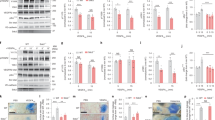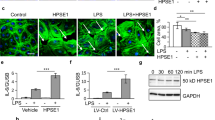Abstract
Syndecan-4 is a transmembrane heparan sulfate proteoglycan belonging to the syndecan family. Syndecan-4-deficient [(Synd4(−/−)] mice were produced to clarify the in vivo role of syndecan-4. Synd4(−/−) mice were more susceptible to κ-carrageenan-induced nephropathy, and the placental labyrinth from the deficient embryos exhibited more thrombi than wild-type ones. Importantly, Synd4(−/−) mice were more susceptible to endotoxin shock. Further analysis revealed that the mechanism to suppress excessive production of interleukin-1β (1L-1β) by transforming growth factor-β (TGF-β) was impaired in the deficient mice. TGF-β, one of the cytokines involved in the suppression mechanism, bound to heparan sulfate chain of syndecan-4, which was induced in macrophages and the microvasculature after administration of lipopolysaccharide. Therefore, augmentation of TGF-β function by induced syndecan-4 was suggested as a mechanism of the suppressive action of syndecan-4 against endotoxin shock. Published in 2003.
Similar content being viewed by others
References
Kojima T, Shworak NW, Rosenberg RD, Molecular cloning and expression of two distinct cDNA-encoding heparan sulfate proteoglycan core proteins from a rat endothelial cell line, J Biol Chem 267, 4870–7 (1992).
David G, van der Schueren B, Marynen P, Cassiman JJ, van den Berghe H, Molecular cloning of amphiglycan, a novel integral membrane heparan sulfate proteoglycan expressed by epithelial and fibroblastic cells, J Cell Biol 118, 961–9 (1992).
Kojima T, Leone CW, Marchildon GA, Marcum JA, Rosenberg RD, Isolation and characterization of heparan sulfate proteoglycans produced by cloned rat microvascular endothelial cells, J Biol Chem 267, 4859–69 (1992).
Bernfield M, Kokenyesi R, Kato M, Hinkes MT, Spring J, Gallo RL, Lose EJ, Biology of the syndecans: A family of transmembrane heparan sulfate proteoglycans, Annu Rev Cell Biol 8, 365–93 (1992).
Kojima T, Katsumi A, Yamazaki T, Muramatsu T, Nagasaka T, Ohsumi K, Saito H, Human ryudocan from endothelium-like cells binds basic fibroblast growth factor, midkine, and tissue factor pathway inhibitor, J Biol Chem 271, 5914–20 (1996).
Kim CW, Goldberger OA, Gallo RL, Bernfield M, Members of the syndecan family of heparan sulfate proteoglycans are expressed in distinct cell-, tissue-, and development-specific patterns, Mol Cell Biol 5, 797–805 (1994).
Ishiguro K, Kojima T, Taguchi O, Saito H, Muramatsu T, Kadomatsu K, Syndecan-4 expression is associated with follicular atresia in mouse ovary, Histochem Cell Biol 112, 25–33 (1999).
Yamashita Y, Oritani K, Miyoshi EK, Wall R, Bernfield M, Kincade PW, Syndecan-4 is expressed by B lineage lymphocytes and can transmit a signal for formation of dendritic processes, J Immunol 162, 5940–8 (1999).
Woods A, Couchman JR, Syndecan 4 heparan sulfate proteoglycan is a selectively enriched and widespread focal adhesion component, Mol Biol Cell 5, 183–92 (1994).
Woods A, Longley RL, Tumova S, Couchman JR, Syndecan-4 binding to the high affinity heparin-binding domain of fibronectin drives focal adhesion formation in fibroblasts, Arch Biochem Biophys 374, 66–72 (2000).
Saoncella S, Echtermeyer F, Denhez F, Nowlen JK, Mosher DF, Robinson SD, Hynes RO, Goetinck PF, Syndecan-4 signals cooperatively with integrins in a Rho-dependent manner in the assembly of focal adhesions and actin stress fibers, Proc Natl Acad Sci USA 96, 2805–10 (1999).
Ishiguro K, Kadomatsu K, Kojima T, Muramatsu H, Tsuzuki S, Nakamura E, Kusugami K, Saito H, Muramatsu T, Syndecan-4 deficiency impairs focal adhesion formation only under restricted conditions, J Biol Chem 275, 5249–52 (2000).
Ishiguro K, Kadomatsu K, Kojima T, Muramatsu H, Nakamura E, Ito M, Nagasaka T, Kobayashi H, Kusugami K, Saito H, Muramatsu T, Syndecan-4 deficiency impairs the fetal vessels in the placental labyrinth, Dev Dyn 219, 539–44 (2000).
Ishiguro K, Kadomatsu K, Kojima T, Muramatsu H, Matsuo S, Kusugami K, Saito H, Muramatsu T, Syndecan-4 deficiency increases susceptibility to kappa-carrageenan-induced renal damage, Lab Invest 81, 509–16 (2001).
Echtermeyer F, Streit M, Wilcox-Adelman S, Saoncella S, Denhez F, Detmar M, Goetinck PF, Delayed wound repair and impaired angiogenesis in mice lacking syndecan-4, J Clin Invest 107, R9–R14 (2001).
Morrison DC, Ryan JL, Endotoxins and disease mechanisms, Annu Rev Med 38, 417–32 (1987).
Ishiguro K, Kadomatsu K, Kojima T, Muramatsu H, Iwase M, Yoshikai Y, Yanada M, Yamamoto K, Matsushita T, Nishimura M, Kusugami K, Saito H, Muramatsu T, Syndecan-4 deficiency leads to high mortality of lipopolysaccharide-injected mice, J Biol Chem 276, 47483–8 (2001).
Li P, Allen H, Banerjee S, Franklin S, Herzog L, Johnston C, McDowell J, Paskind M, Rodman L, Salfeld J, Mice deficient in IL-1 beta-converting enzyme are defective in production of mature IL-1 beta and resistant to endotoxic shock, Cell 80, 401–11 (1995).
Berg DJ, Kuhn R, Rajewsky K, Muller W, Menon S, Davidson N, Grunig G, Rennick D, Interleukin-10 is a central regulator of the response to LPS in murine models of endotoxic shock and the Shwartzman reaction but not endotoxin tolerance, J Clin Invest 96, 2339–47 (1995).
Imai K, Takeshita A, Hanazawa S, Transforming growth factorbeta inhibits lipopolysaccharide-stimulated expression of inflammatory cytokines in mouse macrophages through downregulation of activation protein 1 and CD14 receptor expression, Infect Immun 68, 2418–23 (2000).
Author information
Authors and Affiliations
Corresponding author
Rights and permissions
About this article
Cite this article
Ishiguro, K., Kojima, T. & Muramatsu, T. Syndecan-4 as a molecule involved in defense mechanisms. Glycoconj J 19, 315–318 (2002). https://doi.org/10.1023/A:1025308702966
Issue Date:
DOI: https://doi.org/10.1023/A:1025308702966




